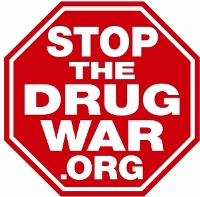A billion "low-value" packages skate past Customs each year. Some contain cheap clothing from China; others contain fentanyl, and a new Senate bill aims to do something about both. But will it actually help?
Nebraska's Republican attorney general is leading a crackdown on shops selling delta-8 THC products, Texas voters strongly support marijuana decriminalization, and more.
A small-town Utah police chief develops a bad habit, a small-town Texas police chief and her fellow cop partner had a side business slinging meth, and more.
The Colombia government and a dissident FARC faction are headed back to the table for peace talks in Havana, and more.
Rhode Island marijuana regulators are moving toward a hybrid licensing process, Iran's new president says his country needs new drug policies, and more.
Massachusetts psychedelic initiative analyzed, Zurich legal weed pilot program evaluated at the one-year mark, and more.
A billion "low-value" packages skate past Customs each year. Some contain cheap clothing from China; others contain fentanyl, and a new Senate bill aims to do something about both. But will it actually help?
Led by Senate Finance Committee Chair Ron Wyden (D-OR), a bipartisan group of senators has filed a bill to tighten Customs controls over packages sent into the United States, justified in part by the effort to interdict small shipments of fentanyl being sent into the country. The cutely-acronymed
Fighting Illicit Goods, Helping Trustworthy Importers, and Netting Gains (FIGHTING) for America Act would also target other "illicit goods," including "counterfeits, and products made with forced labor," according to a
press release from the Senate Finance Committee.
The legislation was provoked by a massive increase in "low-value shipments" (valued at less than $800) of packages into the country from 299 million in 2016 to one billion in 2023, according to a Senate Finance Committee backgrounder. That increase was facilitated by a US policy known as "de minimis entry," allowing those low-value packages to enter the country tariff-free and under a streamlined process to try to conserve scarce government resources and simplify customs procedures for small businesses and consumers.
The backgrounder claims that "unscrupulous corporations like [online retailers] Shein and Temu have abused the system, building entire business models around their ability to flood the US market with direct-to-consumer shipments that avoid both tariffs and Customs scrutiny." Shein was founded in China but is now headquartered in Singapore, while Temu is in Boston and is owned by a Chinese parent company.
The backgrounder also argues that small packages shipped to individual consumers are reliant on international air courier services, making the practice more carbon-intensive than relying on shipping containers. It also says passage of the bill would "level the playing field for US manufacturers" by ensuring that tariffs are imposed.
The bill aims to tighten the rules for de minimis entry and "help the CBP [Customs and Border Patrol] more effectively stop unlawful imports" by prohibiting certain goods -- those that are import-sensitive or facing additional trade remedies -- from being shipped de minimis and by requiring CBP to do more monitoring and information collecting on de minimus entry packages.
"Foreign corporate giants are inundating our borders with millions of low-value packages, making it tough for customs agents to stop dangerous goods like fentanyl from falling into Americans' hands," Wyden said in the statement. "Americans should feel confident that anything arriving on their doorstep is safe, legal, and ethically produced. Our legislation would crack down on foreign companies abusing the law and make sure they play by the rules."
"Whether through the southwest border or in packages mailed into the United States, China is using any tool available to get illicit drugs across our border," Lummis said. "It is time for CBP to crack down on shipments from China to ensure drugs and products made using slave labor are encountered before making it into our communities."
"Countries like China are exploiting the de minimis loophole to cheat our trade laws and flood our country with packages containing fentanyl and other illicit substances," Brown said. "By cracking down on this loophole and providing law enforcement with more resources, this bipartisan legislation will begin to level the playing field for Ohio workers and Ohio manufacturers and retailers -- while helping to stop the deadly flow of fentanyl into Ohio communities."
It is not clear what law enforcement thinks about leveled playing fields for the American economy, but it likes the notion of more interdiction to fight fentanyl.
"Law enforcement is battling the trafficking of illegal narcotics on multiple fronts, including the international mail system. The de minimis loophole is severely exacerbating the opioid crisis by allowing fentanyl and other illegal opioids to enter our country largely uninspected. Substantial reform or the closing of this trade loophole is necessary to remove significant fentanyl trafficking routes into this country and is essential to any national strategy to end the fentanyl crisis," said Bill Johnson, executive director of the National Association of Police Organizations. "NAPO supports the FIGHTING for America Act and we look forward to working with Chairman Wyden to ensure the de minimis trade exemption will no longer be a gateway for illicit drugs and goods to cross our borders."
The Fraternal Order of Police is also down with the bill.
"In an effort to evade detection and interdiction, drug smugglers are using low-value, direct-to-consumer shipments that enter the country, which allows these criminals to bypass the usual screening methods employed by Customs and Border Protection and get fentanyl and other drugs and illicit goods into the United States," said Patrick Yoes, the group's national president. "The FOP supports legislation as proposed by Senators Wyden and Lummis to tighten the rules and crack down on these foreign-based drug traffickers who are using low-value imports to game the system and flood our communities with fentanyl and other illegal goods and substances."
Will the new bill actually help, though, assuming it passes? Regardless of the its potential positive impact on strengthening the US economy in the face of foreign competition -- or on the fight against climate change, for that matter -- its effort to address the fentanyl crisis by pursuing more, better interdiction is akin to playing a game of whack-a-mole with traffickers. For decades, the United States has maintained a policy of stricter and more intrusive interdiction efforts. It has not yet worked yet, and there is no indication this would be any different. Rather than chasing futile pursuits, policymakers would be better off shedding the failed prohibitionist model for dealing with the drug menace du jour and begin going down the path of a safe and regulated drug supply.
back to top
Nebraska's Republican attorney general is leading a crackdown on shops selling delta-8 THC products, Texas voters strongly support marijuana decriminalization, and more.
Marijuana Policy
Trump Embraces Biden Federal Marijuana Rescheduling Move. When it comes to marijuana, the policy differences between the Trump and Harris campaigns are growing smaller and smaller. Harris has sponsored a marijuana legalization bill, and the Biden-Harris administration initiated a marijuana rescheduling process that has the DEA calling for medical recognition under Schedule III. Former President Trump has embraced the Biden rescheduling move, and reiterated his support for Florida's Amendment 3 marijuana legalization initiative.
"As a Floridian, I will be voting YES on Amendment 3 in November," Trump posted on Truth Social, his social media web site, on Sunday night. "As President, we will continue to focus on research to unlock the medical uses of marijuana to a Schedule 3 drug, and work with Congress to pass common sense laws, including safe banking (sic) for state authorized companies, and supporting states rights to pass marijuana laws, like in Florida, that work so well for their citizens."
As president, Trump remained largely indifferent to marijuana policy. He appointed a staunch anti-marijuana conservative, former Alabama Sen. Jess Sessions (R), who as attorney general rescinded Obama-era guidance for federal prosecutors to go easy on marijuana. DOJ's actual practices, however, didn't change much.
Despite the candidate's many crimes, and his depradations while previously in office, at least one observer considers his shift on marijuana policy to be noteworthy.
"For the first time in history, both major party candidates support large-scale cannabis reform," said David Culver, senior vice president of public affairs at the US Cannabis Council, a Washington, DC-based lobby for regulated cannabis companies. "[President Trump] joins millions of Americans who have reassessed their views on cannabis in recent years."

Delta-8 THC joint (Elsa Olofsson via Wikimedia)
Nebraska Attorney General Announces Crackdown on Delta-8 THC Products. State Attorney General Mike Hilgers (R) last week announced a crackdown on "mislabeled" and "dangerous" delta-8 products in the state. Delta-8 THC is a cannabinoid that is not found in significant quantities in marijuana plants but must be manufactured from hemp-derived cannabidiol (CBD). It has psychoactive properties.
Hemp is legal across the United States, but delta-8 THC's legal status is hazier. Attorney General Hilgers' crackdown comes not in the form of criminal enforcement but in the form of lawsuits aimed at retailers who sell products containing delta-8 THC. The first lawsuits were filed against retailers in Norfolk, but Hilgers said more are coming.
"We are ramping up our efforts to clean up Nebraska," Hilgers said. "For the first time, we have sued every store in a community. The stores are misleading Nebraskans."
The lawsuits alleged violations of the Consumer Protection Act, Uniform Deceptive Trade Practices Act, and Nebraska’s Pure Food Act. Hilgers has already filed lawsuits against more than a dozen vape shops and other businesses selling the products, with some cases settled by retailers who promise not to sell the products.
North Carolina Tribe Begins Selling Marijuana to Anyone 21 and Over. The Eastern Band of Cherokee Indians began selling legal marijuana to all adult comers on Saturday at their shop in Cherokee. Everywhere else in the state, possession or consumption of weed -- not to mention sales -- is illegal.
The tribe began selling medical marijuana in April and began selling recreational use marijuana to tribal members beginning in July. Now, sales are open to anyone 21 or over.
The tribe's Great Smoky Cannabis Company called the day "history in the making" and on Facebook posted a video showing people lined up to take advantage of the opportunity on Saturday morning.
"To have access to something like this where it's legal, you know it's organic, you know what you're getting, it's quality, you know you can trust the source," said Hanna Jaffe, a resident of Asheville, 60 miles away. "There's a lot of synthetics on the market. There's a lot of unsafe products on the black market, too," Jaffee said. "Having this access is going to be the way to go."
Texas Poll Has Strong Majority for Marijuana Decriminalization. A new University of Texas/Texas Politics Project poll has strong support for marijuana decriminalization, with more than two-thirds of respondents (68 percent) saying they favored making the penalty for marijuana possession no more than a ticket and a fine, with 42 percent saying they "strongly" favor it.
Majority support for marijuana decriminalization crossed party lines, with 81 percent of Democrats, 61 percent of independents, and even 59 percent of Republicans in favor.
Asked whether the penalty for possession or use of cannabis should be reduced to a citation and fine, 68 percent said they support that proposal, including 42 percent who said they "strongly" favor it. A majority of Democrats (81 percent), Republicans (59 percent), and independents (61 percent) all expressed support for the reform.
The poll also asked about whether laws on a variety of issues should be more strict, less strict, or stay the same. Half of respondents (50 percent) said restrictions on marijuana should be reduced, 18 percent said they should stay the same, and 25 percent said they should be tightened. By contrast, 49 percent of respondents said abortion restrictions should be loosened, 34 percent said gambling rules should be less strict, 22 percent said voting laws should be relaxed and only 13 percent said the same about gun laws. Even in the conservative stronghold state, 58 percent said gun regulations should be more strict.
The poll comes as a handful of Texas cities -- Austin, Denton, Elgin, Harker Heights, Killeen, and San Marco -- have already voted to reform local marijuana ordinances, and several more will be on the ballot in November, including Bastrop and Lockhart in the Austin area, and Dallas.
(This article was prepared by StoptheDrugWar.org's 501(c)(4) lobbying nonprofit, the Drug Reform Coordination Network, which also pays the cost of maintaining this website. DRCNet Foundation takes no positions on candidates for public office, in compliance with section 501(c)(3) of the Internal Revenue Code and does not pay for reporting that could be interpreted or misinterpreted as doing so.)
back to top
A small-town Utah police chief develops a bad habit, a small-town Texas police chief and her fellow cop partner had a side business slinging meth, and more. Let's get to it:
In Gunnison, Utah, the former Gunnison police chief was arrested on September 5 on multiple drug and related charges after he was caught having stolen drug evidence for his own use. Seth Tyler Hendrickson, 41, went down when the local K9 officer went to pick up "training up substances" for his dog, which included 28 grams each of heroin, methamphetamine, cocaine, and marijuana, and found the container for the drugs was missing.
The officer recalled that Hendrickson had taken the drugs to show a youth group the dangers of drugs and realized he had not returned them. Hendrickson repeatedly refused to return the container, and when he finally did, it was short the 28 grams of heroin and some psilocybin stems. When officers searched his home, they found open evidence bags in his vehicle containing 45 grams of heroin, 58 grams of marijuana, and 59 grams of methamphetamine. They also found used syringes in his home, and he tested positive for opioids.
Hendrickson is charged with two counts of possession/use of heroin (class A misdemeanor), possession/use of methamphetamine (class A misdemeanor), possession/use of cocaine (class A misdemeanor), possession/use of marijuana (class B misdemeanor), possession/use of drug paraphernalia (class B misdemeanor), and official misconduct (class B misdemeanor).
In Columbus, Ohio, a former Columbus police officer pleaded guilty on September 1 to stealing and selling more than $100,000 worth of cocaine from crime scenes and evidence rooms. Joel Mefford, 35, was assigned to investigate drug crimes when he worked for the Columbus Police Department, but he and another officer were found to have stolen and trafficked cocaine at least thrice in 2020. He copped to two counts of possessing with intent to distribute 500 grams or more of cocaine, one count of possessing with intent to distribute five kilograms or more of cocaine and one count of money laundering.
In Athens, Texas, a former Payne Springs police officer was sentenced on August 15 to 20 years in federal prison for slinging meth. Jonathan Hutchison had pleaded guilty in April to manufacturing or delivering a controlled substance and possession of a controlled substance. Hutchison went down after police with a search warrant raided the home he shared with Payne Springs Police Chief April Meadows and found illicit drugs inside. Meadows has also pleaded guilty to charges of money laundering and manufacturing or delivery of a controlled substance and awaits sentencing. Hutchison also got two years for tampering with an electronic monitoring device and another two years for possession of a controlled substance, but those sentences run concurrently with the 20-year distribution sentence.
In Montgomery, Alabama, a former state prison guard was sentenced Tuesday to six years in federal prison for smuggling methamphetamine into the Stanton Correctional Facility. Henry Guice Jr., 46, went down when a drug dog alerted on his vehicle in the parking lot of the prison and investigators found three bags of meth. Guice pleaded guilty to possession with the intent to distribute in a plea hearing in May. An inmate at the prison has been charged with conspiring with Guice to sell drugs and faces a February trial.
back to top
The Colombia government and a dissident FARC faction are headed back to the table for peace talks in Havana, and more.

Kamala Harris (Creative Commons)
Marijuana Policy
Harris Campaign Accuses Trump of Lying About Supporting Marijuana Reform But Fails to Detail Her Pot Platform. The campaign of Vice President Kamala Harris (D) is arguing that Donald Trump's recent support for marijuana reform is "blatant pandering" and runs contrary to his administration's record on marijuana policy. Since last weekend, Trump has signaled support for Florida's Amendment 3 marijuana legalization initiative and for rescheduling at the federal level.
"Donald Trump cannot paper over his extensive record of dragging marijuana reform backward," the Harris campaign said in a statement. "As president, Trump cracked down on nonviolent marijuana offenses -- undermining state legalization laws, opposed safe banking legislation, and even tried to remove protections for medical marijuana," spokesperson Joseph Costello told NBC News on Monday. "Donald Trump does not actually believe in marijuana reform, but the American people are smart enough to see through his campaign lies."
But although Trump Attorney General Jeff Sessions rescinded Obama-era guidance urging prosecutorial discretion in enforcing the marijuana laws, no large-scale federal crackdown occurred. He did not publicly oppose or support marijuana banking legislation.
The Harris campaign has been mum about its candidate's position on the issue, and a new, long-awaited policy page on her campaign web site does not address the issue. However, Harris previously sponsored a marijuana legalization bill, and at a March White House event with marijuana pardon recipients reaffirmed her support for legalization. Her running mate Gov. Walz supported several marijuana reform measures while in Congress, and signed a legalization bill in Minnesota last year.
Law Enforcement
Houston Cop Goes on Trial over Misbegotten Drug Raid That Left Two Innocent Civilians Dead. The trial began Monday in Houston for former Houston Police narcotics officer Gerald Goines, who is charged with murder in the deaths of two homeowners gunned down by cops on a drug raid based on a made-up informant. The 2019 raid left Dennis Tuttle, 59, and his wife Rhogena Nicholas, 58, dead after they opened fire on the assailants breaking down their door.
Goines, who led the raid, is accused of lying about the couple to obtain a search warrant, saying they were dangerous heroin dealers when the only drugs found in the home after the raid were personal use amounts of marijuana and cocaine. He is also accused of making up the informant the search warrant affidavit was based on.
A dozen officers tied to the narcotics squad that carried out the raid have subsequently been indicted on various charges following a corruption probe into the squad. The state Court of Criminal Appeals has overturned at least 22 convictions linked to Goines. Another Goines arrest that remains under scrutiny is his 2004 arrest of George Floyd, whose 2020 death at the hands of a Minnesota police officer sparked a nationwide reckoning on racism in policing.
"After more than five years of providing extensive discovery, attending numerous hearings, and navigating various trial delays, the time for justice looms now," prosecutors said in court documents.
"Mr. Goines has the best counsel you could possibly get," Houston defense attorney Michael Wynne said. "But I think they got an uphill battle here."
International
Colombia Peace Talks with Dissident FARC Faction to Resume. The government of leftist President Gustavo Petro and the Segunda Marquetalia, a dissident FARC guerrilla faction, jointly announced Monday that they would resume peace talks in Havana, although they did not set a date. The Segunda Marquetalia had unilaterally agreed to a ceasefire in June, but talks broke down in July, with the guerrillas complaining that the government had failed to quash arrest warrants against their leaders.
The faction broke with the main body of the FARC after the 2016 peace agreement between the government and the leftist guerrillas. It was one of several leftist factions to remain under arms and, like the other factions, as well as rightist paramilitaries and unaffiliated drug trafficking groups, relies on the coca and cocaine trade to help finance its campaigns.
In the Monday statement, both sides condemned a weekend incident where an indigenous person was killed and six others wounded in an army operation in a coca-growing area of Narino department, where Segunda Marquetalia is active.
(This article was prepared by StoptheDrugWar.org's 501(c)(4) lobbying nonprofit, the Drug Reform Coordination Network, which also pays the cost of maintaining this website. DRCNet Foundation takes no positions on candidates for public office, in compliance with section 501(c)(3) of the Internal Revenue Code and does not pay for reporting that could be interpreted or misinterpreted as doing so.)
back to top

Iran human rights display, courtyard of the United Nations Office at Vienna building (David Borden)
Rhode Island marijuana regulators are moving toward a hybrid licensing process, Iran's new president says his country needs new drug policies, and more.
Marijuana Policy
Florida's Young Republicans Clash with Trump Over Marijuana Legalization. Donald Trump's endorsement of the Florida Amendment 3 marijuana legalization initiative is causing ruptures among Florida Republicans, with young GOP members strongly opposing the measure. That leaves them siding with Gov. Ron DeSantis and state GOP Chairman Evan Power against the measure, with their party's presidential candidate on the other side.
The Capital Young Republicans of Tallahassee released a statement slamming Trump's "rushed endorsement" of the measure. The group and other Florida Young Republican organizations said the endorsement displayed "a clear lack of judgment" and undermined thoughtful consideration of important policies.
"Amendment 3 is bad policy," the statement says. "It was written by a small cadre of corporations to try to enrich their monopoly and profits while destroying the Florida we all know and love. This Amendment is for corporations, not conservatives."
[Editor: Go ahead. Fight amongst yourselves. - DB]
The GOPers are correct that the initiative would benefit existing medical marijuana operators, including the multistate operator Trulieve, which has spent more than $70 million to try to get it passed. But the licensing system the initiative calls for would be open for other businesses to apply, at least if they are able to surmount manage the admittedly high capital requirement and other challenges to winning one of the admittedly small number of initial licenses.
In any case, legalization is needed to remove the fear of arrest and prosecution for marijuana possession in Florida. More than 16,000 Floridians were arrested on small-time pot possession charges last year.
Rhode Island Regulators Propose Lottery for Pot Business Licenses. The Rhode Island Cannabis Control Commission, charged with implementing the state's two-year-old marijuana legalization law, voted unanimously last Friday to give preliminary approval to a hybrid process for deciding who will get one of the two dozen marijuana business licenses to be handed out by the state.
The two-part process would first screen applicants for their "ability and readiness for licensure," and then have a lottery to determine who gets the licenses. However, the lottery would only apply in zones where the demand for licenses outweighs the supply.
Under the state's marijuana law, retail licenses are spread across six geographic zones, with a maximum of four per zone, two are reserved for social equity applicants and workers' cooperatives.
But licensing won't happen until regulators finalize regulations for the industry. Draft regulations have been getting adopted on a piecemeal basis though the summer, and it's not clear when they'll be finalized.
"If you take one thing away from my feelings about this, it is to avoid further delay for the industry," Commission Chair Kimberly Ahern said during Friday's meeting. "It is what I have heard over and over and over again."
Drug Policy
Bipartisan Federal Bill Aims to Catch Fentanyl Packages, Among Other Things. Five senators -- Ron Wyden (D-OR), Cynthia Lummis (R-WY), Sherrod Brown (D-OH), Susan Collins (R-ME), and Bob Casey (D-PA) -- have filed a bill "to help Customs and Border Protection (CBP) stop the flow of illicit goods, including fentanyl, counterfeits, and products made with forced labor, into the country by tightening import requirements for low-value packages," according to a statement from the Senate Finance Committee.
"Foreign corporate giants are inundating our borders with millions of low-value packages, making it tough for customs agents to stop dangerous goods like fentanyl from falling into Americans' hands," Wyden said. "Americans should feel confident that anything arriving on their doorstep is safe, legal, and ethically produced. Our legislation would crack down on foreign companies abusing the law and make sure they play by the rules."
The legislation takes aim at de minimis entry, which allows low-value packages to undergo an expedited process of entry into the US with lower levels of customs scrutiny. The cutely-acronymed Fighting Illicit Goods, Helping Trustworthy Importers, and Netting Gains (FIGHTING) for America Act "would tighten the rules for de minimis entry and help CBP more effectively stop unlawful imports," the statement explained.
The legislation is supported by Oregon AFL-CIO, AFL-CIO, National Council of Textile Organizations (NCTO), Parents Against Vaping e-Cigs (PAVe), Voices for Awareness | Facing Fentanyl Now, National Association of Police Organizations, Fraternal Order of Police, United Steelworkers (USW), United States Footwear Manufacturers Association (USFMA), National Treasury Employees Union, and the Outdoor Industries Association.
International
Iran's New President Says Drug Fighting Strategies Need to Be Revised. As long as there is demand for illegal drugs, there will be a supply, so strategies for dealing with illicit drugs must focus on tamping down demand, President Masoud Pezeshkian said Monday in remarks at the nation's anti-drug headquarters.
While referring to addiction as a significant social problem, Pezeshkian said efforts to combat it in recent years have been ineffective.
"Despite the many efforts that have been made in the country, we are still a long way from optimal conditions, which makes it necessary to review and change the current methods by learning from the successful experiences of other countries," Pezeshkian added.
Focusing on cutting supply is a mistake, he said. Better to try to identify at-risk populations, develop preventive strategies, provide treatment, and reintegrate addicts back into society, he said.
In recent years, Iran has expanded its treatment modalities and embraced harm reduction in response to high levels of addiction. But the country has also increasingly resorted to the death penalty for some drug offenses, in numbers that have widely varied through the years -- but especially in the last two years, after an uprising against the regime followed the death two years ago this month of Mahsa Amini, who was beaten by religious police for not properly wearing a head scarf.
back to top
Massachusetts psychedelic initiative analyzed, Zurich legal weed pilot program evaluated at the one-year mark, and more.

Zurich, Switzerland. The city seems happy with its year-old pilot program of legal marijuana sales. (Pixabay)
North Dakota Marijuana Legalization Faces Organized Opposition from Usual Suspects. The Measure 5 marijuana legalization initiative from New Economic Approach is drawing organized opposition from some unsurprising sources. The state's Medical Association, Hospital Association, Peace Officers Association, Chiefs of Police Association, and Sheriffs and Deputies Association say they are uniting to block the measure.
"Don't buy into the argument that legalization of recreational marijuana will free up law enforcement to focus on more serious crime," Mandan Police Chief Jason Ziegler said in a statement. "In fact, quite the opposite will happen. Legalization will lead to an increase in traffic accidents and fatalities."
While the cops emphasized law enforcement, the North Dakota Medical Association emphasized health risks of the measure.
"Studies have shown that frequent use of marijuana is associated with the development of substance use disorders, impaired cognitive function, cancer, and mental health issues such as anxiety, psychosis and depression," Dr. Stephanie Dahl, president of the North Dakota Medical Association, said in a statement.
But Steve Bakken, chair of New Economic Frontier and the Measure 5 sponsoring committee, pushed back, saying a legal, regulated market would reduce the size of the black market.
"A regulated market helps insure the availability of safer, uncontaminated products, reducing health risk associated with legal marijuana," Bakken said.
The North Dakota Petroleum Council, Association of General Contractors, North Dakota Motor Carriers, North Dakota Farmers Union, North Dakota Catholic Conference, and North Dakota Family Alliance also have come out against the recreational marijuana measure, according to the news release.
Psychedelics
Massachusetts Psychedelic Legalization Initiative Analyzed. The Center for State Policy Analysis (CSPA) at Tufts University Jonathan M. Tisch College of Civic Life has released a report evaluating the potential impact of Ballot Question 4, which would legalize a group of naturally occurring psychedelic drugs -- psilocybin, psilocyn, mescaline, DMT, and ibogaine -- for use at home and eventually in a network of therapy centers.
"Two other states have legalized select psychedelics," said Evan Horowitz, executive director of CSPA. "But Question 4 goes further, with therapy centers that can offer a wider array of psychedelic drugs. Massachusetts voters need to decide if they want to be at the vanguard of this experiment."
The fairly anodyne report found that:
- Psilocybin (found in "magic mushrooms") shows promise as a treatment for some serious mental health conditions, including anxiety among patients with terminal illnesses.
- Psychedelics are associated with some substantial harms. For instance, ibogaine can cause acute cardiac problems, while DMT (used in ayahuasca) may have lasting neurological effects.
- The rules for using psychedelics would be different from current laws around marijuana. Adults will not be able to purchase psychedelics at a retail outlet. They will need to grow their own, find a person willing to share, or use at a licensed facility.
- Treatment at licensed psychedelic therapy centers would likely be expensive, encouraging more at-home and personal use, where the lack of guidance and oversight brings heightened risk.
- Federal authorities consider all of these drugs illegal, so passing Question 4 could lead to a federal backlash.
International
Mexican Cartel Clashes Raise Fears of Civil War within Sinaloa Cartel. Culiacan, the Sinaloa state capital, saw heavily armed gunmen on foot and riding pick-up trucks Monday, with a soundtrack of background gunfire. At least one soldier and two civilians were killed in gunbattles that day, raising fears that a factional dispute within the Sinaloa Cartel is about to turn into a cartel war.
Tensions within the Sinaloa Cartel have been on the rise ever since one of imprisoned cartel leader Joaquin "El Chapo" Guzman's sons kidnapped cartel co-founder Ismael "El Mayo" Zambada and delivered him to US authorities in July. The junior Guzman also turned himself in to the feds. El Mayo led one cartel faction, while Guzman's sons, "Los Chapitos," led the other. In response to Monday's violence, Mexican authorities sent another 90 special forces to the state on Tuesday.
"It is believed that there may be more fighting and that these clashes are between the same two groups (within the cartel)," said America Armenta, an independent Sinaloan journalist in Culiacan.
Outgoing Mexican President Andres Manuel Lopez Obrador said the government is "watching and taking action" to ensure calm. "It's a confrontation, and I hope it's temporary," Lopez Obrador said.
Switzerland Legal Marijuana Experiment Assessed Positively at One-Year Mark. After a year of a pilot project on marijuana legalization in Zurich, an initial assessment finds that some 2,100 participants made 36,000 transactions, with nearly nine-out-of-ten (88%) praising product quality.
The city began allowing the sale of marijuana products in August 2023 under the rubric "Züri Can -- Cannabis with Responsibility."
"We show that modern preventive work can go hand in hand with controlled access to cannabis products," said Andreas Hauri, the councilor responsible for health and environment.
Employees of sales points have established relationships with project participants, which allows them to offer not only products but also knowledge on safer and less risky use of cannabis.
"90% of participants rate the sales staff as competent and helpful," said Barbara Burri, project manager.
Not everything was rosy. One recurring complaint from participants was a lack of selection of marijuana products. Project managers plan to introduce four new marijuana strains next year. The pilot program itself is set to run through October 2026.
back to top






